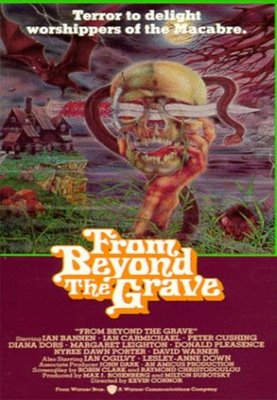
FROM BEYOND THE GRAVE
UK, 1973, 98 minutes, Colour.
Peter Cushing.
The Gate Crasher: David Warner, Wendy Allnutt.
An Act of Kindness: Donald Pleasence, Ian Bannen, Angela Pleasence, Diana Dors.
The Elemental: Ian Carmichael, Margaret Leighton, Nyree Dawn Porter.
The Door: Ian Ogilvy, Lesley- Anne Down, Jack Watson.
Directed by Kevin Connor.
From Beyond the Grave is a composite horror thriller, Peter Cushing as a seller of antiques forms the setting for four rather odd stories of people who are greedy and rob for their own purposes. The results are horrific. There is an ironic comedy in the treatment of some of the stories, especially The Elemental with a delightfully daffy performance by Margaret Leighton. Donald Pleasence stands out in An Act of Kindness. The director is Kevin Connor who also made the tongue-in-cheek thriller Trial by Combat with John Mills and Peter Cushing. Connor also made the series the Land that Time Forgot and The People That Time Forgot and the excellent At The Earth's Core. Enjoyable in its way and, if one story does not please, then another will. Moralising horror stories.
1. The appeal of horror films, their reality and their fantasy? Themes of good and evil, conscience, guilt? The audience's projection and self defence as regards evil?
2. Comment on the device linking the particular stories: the shopkeeper, Temptations Limited, his allowing people to make their mistakes? His ironic comment? The thief at the end and his grisly ending?
3. The overall impact of having four stories? Did they cohere, stand on their own feet?
4. (i) The Gate Crasher: the central character, his reason for cheating the shopkeeper, his way of life, the seance, the experience of the face, his friends, his curious involvement, his discovery of the room, the seeking for victims and the gruesome aspects of this, his gradually becoming a prisoner of the mirror? The point about human greediness and cruelty?
(ii) An Act of Kindness: the presentation of Christopher Lowe as an ordinary man, yet his lying about the medals, his boasting, his British Army style? The contrast with his horrible home, the slovenliness of his wife and her attitude, his child? His reliance on the match-seller and his friendship, the British Army style of the seller, his daughter? Their pleasant appearance, their meals, gradually turning sinister? The nature of their hold over Lowe? His allowing himself to be involved, especially with the daughter? The atmosphere of dreams, magic, superstition? Wishful thinking and murders being committed? The wife's death, Lowe's own death? The irony of the wedding cake and the killing via the bridegroom's doll? The revelation that the seller and his daughter were in league with the child? What point was being made about human nature?
(iii) The Elemental: the humorous tone of this story, the eccentricity of Madam Orloff? The reason for Reggie warren's changing the price tag, his beating down the salesman? The experience in the train, the stupidity of Madam Orloff, yet the reality of the elemental? Details of atmosphere, the dog running away, the experience of the wife with the slap, being strangled in bed? The melodramatics of madam Orloff's arrival and her treatment? The humour of her character? The sinister aspects of the elemental having taken over the wife and killing her husband?
(iv) The Door: what kind of man was the central character, his not cheating the shopkeeper, his involvement with the door, the control of the room, his escape and relationship with his wife, his becoming a victim, attacking the door? The point about human nature?
5. The film as an exploration of evil, victims and victimizers, sin and foolishness? Acceptable fables about human nature via horror?